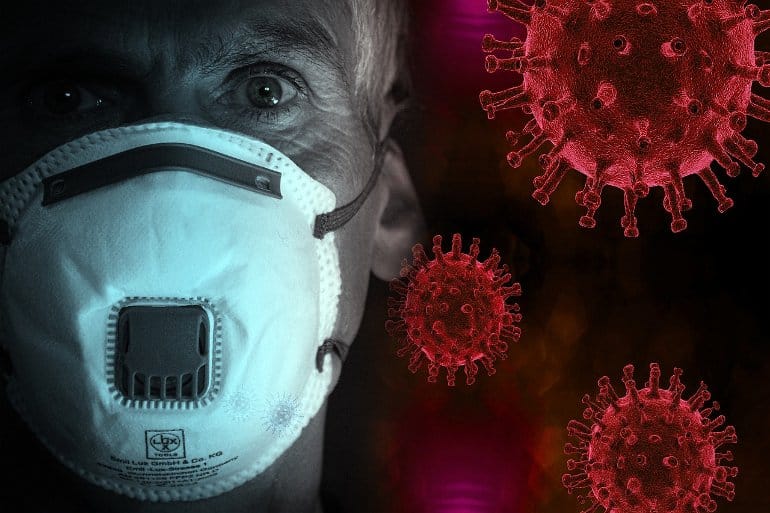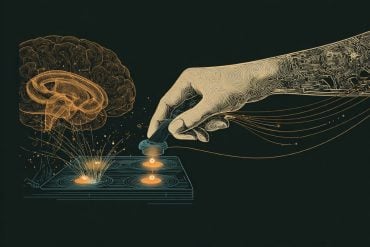Summary: The risk of developing Alzheimer’s disease almost doubled in older people during the one-year period following COVID-19 infection.
Source: Case Western Reserve
Older people who were infected with COVID-19 show a substantially higher risk—as much as 50% to 80% higher than a control group—of developing Alzheimer’s disease within a year, according to a study of more than 6 million patients 65 and older.
In a study published today in the Journal of Alzheimer’s Disease, researchers report that people 65 and older who contracted COVID-19 were more prone to developing Alzheimer’s disease in the year following their COVID diagnosis. And the highest risk was observed in women at least 85 years old.
The findings showed that the risk for developing Alzheimer’s disease in older people nearly doubled (0.35% to 0.68%) over a one-year period following infection with COVID. The researchers say it is unclear whether COVID-19 triggers new development of Alzheimer’s disease or accelerates its emergence.
“The factors that play into the development of Alzheimer’s disease have been poorly understood, but two pieces considered important are prior infections, especially viral infections, and inflammation,” said Pamela Davis, Distinguished University Professor and The Arline H. and Curtis F. Garvin Research Professor at the Case Western Reserve School of Medicine, the study’s coauthor.
“Since infection with SARS-CoV2 has been associated with central nervous system abnormalities including inflammation, we wanted to test whether, even in the short term, COVID could lead to increased diagnoses,” she said.
The research team analyzed the anonymous electronic health records of 6.2 million adults 65 and older in the United States who received medical treatment between February 2020 and May 2021 and had no prior diagnosis of Alzheimer’s disease.
They then divided this population two groups: one composed of people who contracted COVID-19 during that period, and another with people who had no documented cases of COVID-19. More than 400,000 people were enrolled in the COVID study group, while 5.8 million were in the non-infected group.

“If this increase in new diagnoses of Alzheimer’s disease is sustained, the wave of patients with a disease currently without a cure will be substantial, and could further strain our long-term care resources,” Davis said.
“Alzheimer’s disease is a serious and challenging disease, and we thought we had turned some of the tide on it by reducing general risk factors such as hypertension, heart disease, obesity and a sedentary lifestyle.
“Now, so many people in the U.S. have had COVID and the long-term consequences of COVID are still emerging. It is important to continue to monitor the impact of this disease on future disability.”
Rong Xu, the study’s corresponding author, professor of Biomedical Informatics at the School of Medicine and director of the Center for AI in Drug Discovery, said the team plans to continue studying the effects of COVID-19 on Alzheimer’s disease and other neurodegenerative disorders—especially which subpopulations may be more vulnerable—and the potential to repurpose FDA-approved drugs to treat COVID’s long-term effects.
Previous COVID-related studies led by CWRU have found that people with dementia are twice as likely to contract COVID; those with substance abuse disorder orders are more likely to contract COVID; and that 5% of people who took Paxlovid for treatment of COVID symptoms experienced rebound infections within a month.
About this aging, COVID-19, and Alzheimer’s disease research news
Author: Megan Hahn
Source: Case Western Reserve
Contact: Megan Hahn – Case Western Reserve
Image: The image is in the public domain
Original Research: Open access.
“Association of COVID-19 with New-Onset Alzheimer’s Disease” by Pamela Davis et al. Journal of Alzheimer’s Disease
Abstract
Association of COVID-19 with New-Onset Alzheimer’s Disease
An infectious etiology of Alzheimer’s disease has been postulated for decades. It remains unknown whether SARS-CoV-2 viral infection is associated with increased risk for Alzheimer’s disease.
In this retrospective cohort study of 6,245,282 older adults (age ≥65 years) who had medical encounters between 2/2020–5/2021, we show that people with COVID-19 were at significantly increased risk for new diagnosis of Alzheimer’s disease within 360 days after the initial COVID-19 diagnosis (hazard ratio or HR:1.69, 95% CI: 1.53–1.72), especially in people age ≥85 years and in women.
Our findings call for research to understand the underlying mechanisms and for continuous surveillance of long-term impacts of COVID-19 on Alzheimer’s disease.







